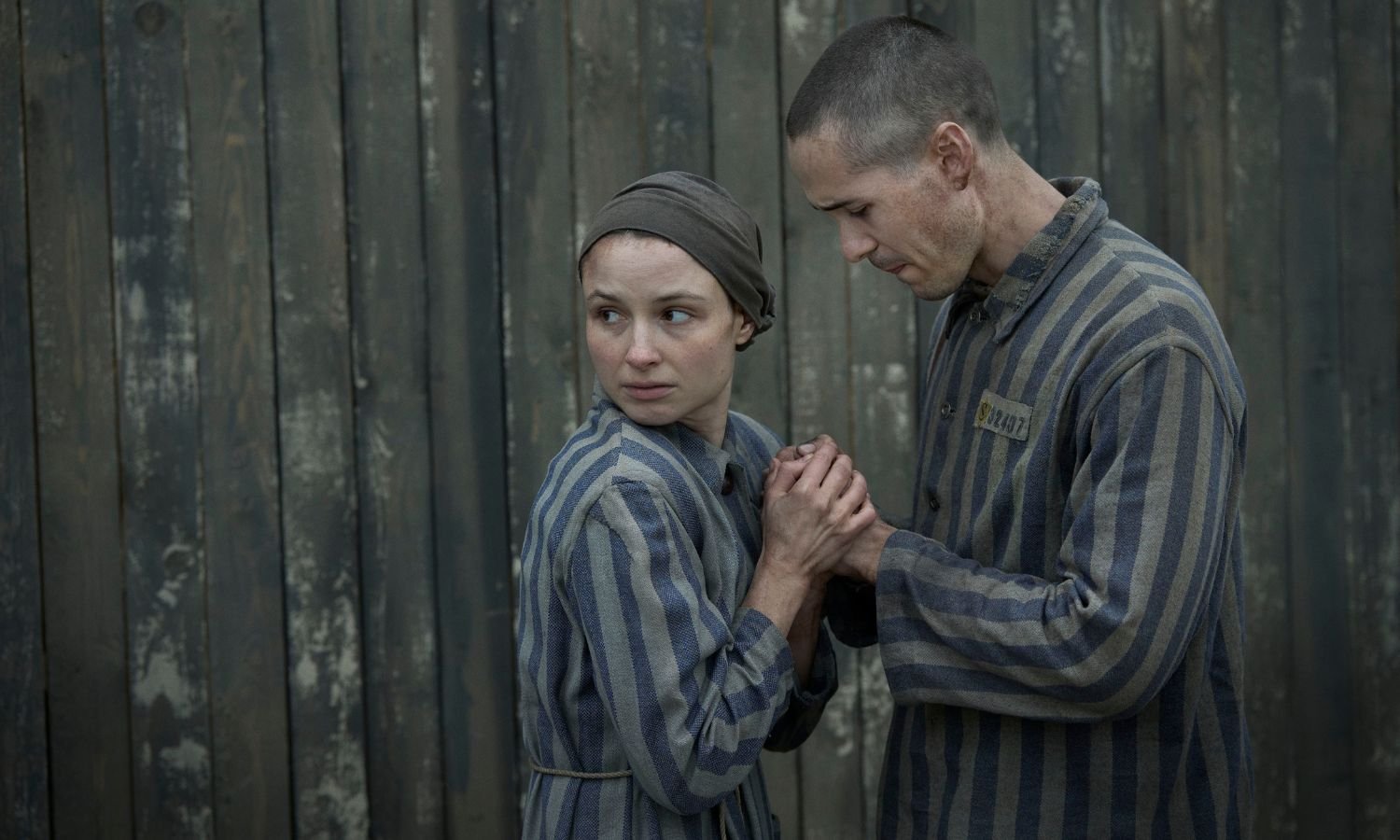Must Watch: The Tattooist of Auschwitz
Glasgow-born TV producer Claire Mundell tells Hood how she fell in love with the best-selling book The Tattooist of Auschwitz and spent six years bringing it to our screens with an impressive cast including Harvey Keitel.
In 2018, writer Heather Morris published her debut book The Tattooist of Auschwitz, a memoir that tells the story of Lali and Gita, and the hopefulness of their love, which was born in the unlikely, terrifying and murderous environment of Auschwitz, the most notorious of World War II’s Nazi concentration camps. It quickly became the book everyone was reading.
Claire Mundell, creative director at Glasgow-based production company Synchronicity Films and award-winning producer of The Cry and Mayflies, is, of course, a lover of books in general but is also always keeping her eyes and ears alert for the next story that could be recreated for screens, big and small. She kept seeing people reading The Tattooist of Auschwitz and wanted to know why, so read it for herself:
“As a producer, I’m drawn to stories based on real life. It was clearly a very moving, emotional and epic story. And the idea of a love story set in Auschwitz was incredible; how could two people fall in love in one of the most notorious concentration camps? Lali’s memoir spoke to me about our innate capacity for hope and survival. I hadn’t seen such a story portrayed on screen before, certainly not for a mainstream global audience.”
Claire Mundell, Executive Producer of The Tattooist of Auschwitz, on set
After speaking with author Morris, Mundell acquired the rights to the book in 2018 before anyone else snapped them up and as executive producer has spent the last six years bringing the new Sky drama to our screens - launching May 2nd. With its impressive cast, including Harvey Keitel, Melanie Lynskey and Jonah Hauer-King, an often haunting, musical score by Oscar-winning film composer Hans Zimmer and end credit song by Barbra Streisand, Mundell hopes that the six-part drama will inform new audiences about the horrors of the holocaust before we lose the last of its survivors:
“Earlier in 2018 I had seen several articles citing a Holocaust Awareness survey which claimed to show that 41% of Americans and 66% of American millennials, at that time, did not know what Auschwitz was. I found it inconceivable that ignorance of the Holocaust could be so extensive and was therefore curious why The Tattooist was selling millions of copies at a time when Holocaust awareness seemed to be in decline. But the book’s success soon became clear – Lali and Gita’s story of love and survival was truly inspiring. It offered hope in the bleakest of worlds, a sentiment all audiences can all identify with.”
So, with the rights secured, Mundell’s work began. She admits the Holocaust genre is a crowded place, “what will we do with this adaptation that will give it distinctiveness?”.
According to Mundell, a 90-minute film was out of the question. There was too much to the story to fit into a film. At this point no one was doing the genre in TV but a six-part drama seemed the right way to go. But how to adapt such an epic story into a long-form TV show? She and series screenwriter Jacquelin Perske long debated how best to approach it. The book itself is written purely from Lali’s perspective. Author Heather Morris doesn’t write herself into the story at all. However, her short postscript at the end of the book gives a glimpse into the close relationship she built up with this grieving elderly man. A man who she really met by chance, through a friend of a friend of Lali and Gita’s son Gary, and ended up spending hundreds of hours, just listening to him and his experiences. It was this postscript that unlocked the key into how Mundell and her team would tell Lali’s story.
“There’s something so poignant in these two people connecting. A man who’s been through so much, haunted by the people that didn’t come back and haunted by his Nazi tormentor Baretzki. He is a survivor that needs to tell his story 60-plus years later. And here is this ordinary, everywoman, there to help him make sense of what happened. Bringing Heather Morris into the drama, listening to Lali’s account years after the events took place, meant we could take the audience’s point of view and move between present and past. It’s an interesting way to explore trauma and survivor’s guilt.”
Harvey Keitel as modern day Lali with Melanie Lynskey as the book’s author Heather Morris
Casting was key. From the outset, Mundell had Jonah Hauer-King in mind. What she didn’t know was that Hauer-King was already keen as he’d heard wind of the project and wanted in. After a long lunch, where both pitched to each other without realising that they were both on the same page, he was locked in as young Lali before a director was even attached.
“It was important to us from the start that the project had authentic casting, especially in the role of Lali. Jonah is from the Jewish community and he has family that have experienced the subject matter. His family fled from Poland. His upbringing is steeped in the stories.”
Anna Próchniak as Gita with Jonah Hauer-King as young Lali
Anna Próchniak, who stars as Gita, was a longer search. Initially trying for smaller roles, she kept rising through the casting process. Mundell explains: “We kept asking her back and so thought maybe we should get her to read for Gita. When she did she just blew us away. She was astonishing. The fact that she is Polish adds a richness to her in the role because as a country they are obviously very familiar with the holocaust.”
Harvey Keitel felt the role as modern day Lali was ‘in the wind’ for him and both Lali’s son Gary and the book’s author Heather Morris were amazed by his likeness to the real Lali. Mundell says: “Harvey was the only actor we offered to. Of course, he’s an incredible actor but it was the twinkle in his eye and the mischievousness that really chimed with what I’d seen of the real Lali. There was some footage and lots of photographs that Lali’s son Gary and also Heather had given us so he had a lot to work with.”
The on-screen relationship that develops between Harvey Keitel’s old Lali and Melanie Lynskey’s Heather Morris is a delight and tugs at the heart strings throughout the series. Lynskey’s character sometimes says so little but her face, her gentle mannerisms, say so much.
“Our director Tali (Shalom-Ezer) sometimes joked that she wanted to do one of Melanie’s scenes just on her face because, on doing nothing, she did everything. Her ‘Heather’ is so empathetic. She’s there to learn, to be an ally, to help him make sense of the terrible things that happened.”
In Mundell’s view, the most difficult role to cast was that of Baretzki, young Lali’s Nazi tormentor: “It’s a really hard role to play. You want to make it clear to the audience that this person is a psychopath, the persecutor of Lali and his acts of brutality are well documented. But you want the character to be a 360 degree character without making you feel sorry for him. Jonas Nay is an incredible German actor who I’d seen in Deutschland 83/86/89 and he plays Baretzki in such a chilling, unhinged way that is full of depth and unsettling emotion.”
Jonah Hauer-King as Lali with Jonas Nay as his Nazi tormentor Baretzki
Striving for authenticity, as far as possible, meant that many of the cast and crew have family members affected directly by the Holocaust. Add in that the subject matter is harsh and often disturbing, that the replica set of Auschwitz was very real and there was such attention to historical accuracy throughout, brought by Naomi Gryn as the Historical and Jewish Cultural Consultant, means there is a realness to every element of this TV adaptation. Mundell was aware that the whole experience of creating this show may have lasting implications on all involved. She felt it was important to support both cast and crew throughout and did that with the of help Solas Mind, which offers mental health and wellbeing support in the creative industries. “This was a heavy environment for people to be working in and therefore emotionally confronting, but the team never wavered from the privilege of telling Lali’s story with as much authenticity as possible.”
The six-part drama of The Tattooist of Auschwitz is a triumph that delicately pays homage to Gita and Lali’s story while illuminating that there can be hope in the face of hatred. A message that resonates today, in the world we are living in. As Mundell concludes: “Although this is a very relatively dark and murderous world in which we tell the story, it is ultimately a story of hope and survival. It's there to remind everybody that you can find the way out of difficult circumstances if you remember your own humanity and hold on to it. Hold on to the ability to connect and love another person. The remaining survivors of the Holocaust will not be with us for much longer. So to have the opportunity to dramatise the experience of a survivor who was courageous enough to share his story is really special.”
The Tattooist of Auschwitz launches on Sky Atlantic on May 2nd






